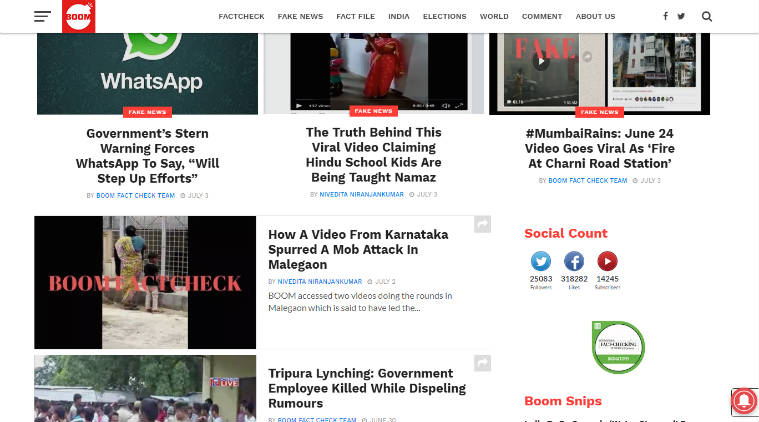 WhatsApp’s reply also finds mention of BoomLive, which is an independent fact-checking website.
WhatsApp’s reply also finds mention of BoomLive, which is an independent fact-checking website.
After Facebook, WhatsApp is now under scrutiny for the spread of “fake” news, or misinformation, on its platform. Amid growing incidents of lynching, the Government of India sought a reply from the company on measures taken by it to curb the spread of rumours. The Facebook-owned company, in a letter to MeiTY, has listed the two-fold strategy that it will be implementing in this aspect.
WhatsApp’s reply also finds mention of BoomLive, which is an independent fact-checking website. Present on various social media platforms such as Facebook, Twitter as well as WhatsApp, the site can be directly contacted by people who want to get the authenticity of content like photos, videos, etc being circulated on social media platforms verified.
BoomLive regularly publishes its own articles as well, which debunk fake news and prevent from further spreading. In a conversation with indianexpress.com, BoomLive Managing Editor Jency Jacob revealed some interesting things on how the site tackles the issue of misinformation and the means by which they are verified. Here are the excerpts from the interview:
How can people approach BoomLive for fact-checking?
We are on WhatsApp and we have a helpline. We have been advertising the helpline for seven to eight months now. That helpline is a number we put out everywhere, inviting people to write to us and forward images, videos, and other content that needs to be verified.
WhatsApp is one of the mediums that people use to approach us. They also tag us on Twitter and Facebook as well. If you get a WhatsApp forward and you have our helpline number saved on your phone, it becomes easy for them to send them to us for verifying.
Also read:
How do you respond and how much time does it usually takes?
In response, either we write to them or we send links to our stories we have already done, which we think will clarify their doubts. Apart from that, we send our broadcast messages to people who want to be informed about our fact checks. We forward them stories we write on a daily basis.
How fast do users get a response from us depends on how readily is the information available. Sometimes it might take two hours to do a story, while at times it takes one and a half day even. We reply on the same medium.
How many queries do you receive in a day on an average? Does every user get a reply?
We get about 25-30 queries every day. Usually, every user gets a reply. Ours is not an automated reply system, and it is very difficult to implement this as we get a lot of random questions at times.
What is the most common way by which misinformation is spread?
Of course, photos, videos, and text are the most common mediums by which people spread misinformation. Then there is a combination of stuff. For example, the video may be true, but text along with it may have changed. That happens quite regularly, in fact, 95 per cent of the times.
Also read:
Any interesting isolated incident that you can remember of?
Frankly, most of the stuff that we get is interesting as a lot of random things are put out. Fake quotes like Raghuram Rajan telling Rahul Gandhi he had warned about Nirav Modi scam and various others are quite common. We always get in touch with people who are being talked about. In our fact-checks, we do not generally rely on third-party sources.